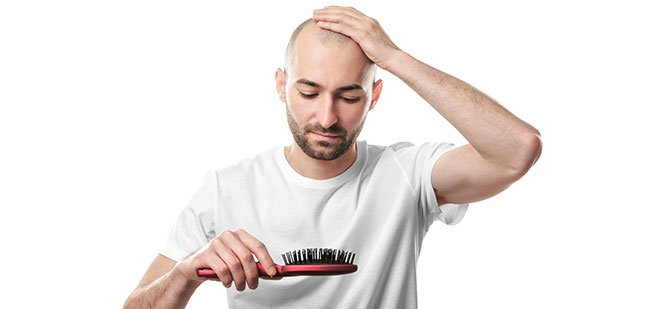We asked Dr. Kenan Omurtag for some insight into hair loss treatments for men and here’s what he answered…
What are a guy’s ‘chances’ of facing hair loss and is there any treatment?
Up to 50% of men will experience hair loss by age 50. As a result, numerous hair growth/recovery products are pitched to men between the ages of 21-45 on television, radio, and the internet. The primary prescription treatments for hair loss include topical Minoxidil (RogaineÒ) and oral Finasteride (Propecia®). These first-line therapies are rather effective. One study shows that using Minoxidil effectively decreased hair loss areas in >60% of the participants and another study shows that taking oral Finasteride resulted in a . Most of the questions that typically come up in my clinic about hair loss medication’s impact on fertility are related to the oral drug, Finasteride (Propecia®).
Are there sexual health side effects from taking these drugs?
Minoxidil (RogaineÒ) and the numerous topical solutions that purport to reduce scalp DHT levels do not appear to affect male sexual function and/or fertility. Much of the concern expressed in my clinic focuses on oral finasteride.
Oral Finasteride (Propecia®) works by reducing the conversion of testosterone (T) to DHT. Rarely, oral Finasteride has been associated with sexual function related adverse events:

Will taking oral Finasteride (Propecia®) impact conception?
Probably not, but it may cause a reversible decrease in your sperm concentration and motility. You should, therefore, exercise caution when using oral Finasteride and, if you are trying to conceive, you might want to strongly consider stopping the drug.
Regarding oral Finasteride’s effect on sperm production, it is well known that androgens, particularly testosterone (T), play a dominant role in sperm production but both type 2 5-alpha reductase enzyme and DHT hormone do not appear to play a crucial role. Even so, one study showed a negative, reversible effect on sperm count and motility when taken at higher doses (5mg finasteride). Other large population studies have also corroborated findings that document a reversible decrease in sperm counts in men taking the lower 1mg dose of oral Finasteride (Propecia®).
In summary, taking oral Finasteride may lower your sperm counts and sperm motility, BUT there is no human data to suggest that it directly causes a decrease in fertility.
So what should a guy do if he and his partner are trying to conceive and he’s taking oral Finasteride (Propecia®)?
- If your sperm counts are normal, proceed with caution.
- If your sperm count and motility are already low, then you should strongly consider discontinuation of the medication. Note that It may take 3-6 months before you see any improvement in your sperm concentration or motility.
- If you have been trying to conceive for >6 months without success and you are taking oral Finasteride, use a home test such as YO Home Sperm () to check sperm count and motility. It’s accurate and reliable.
- If your YO results are abnormal, I recommend a comprehensive semen analysis and an appointment with a fertility specialist.
- If you use the YO sperm test to check sperm count and motility and the results are normal AND you have been trying to conceive (TTC) for >6 months, you and your partner should still see a fertility specialist to make sure there is not something going on with either of you.
Ultimately, each situation is unique, talk with a fertility specialist for the best advice.

